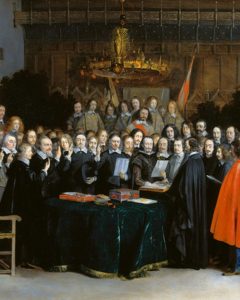Trump's Triumph: On the Way to a Second Westphalia?

2019-11-09
Elimination of Abu Bakr al-Baghdadi, the leader of the ISIS terrorist organization, was a bright victory for Donald Trump's presidential administration. However, the implications extend far beyond eliminating the number one Middle East terrorist.
It is extremely interesting that Trump openly expressed gratitude to the governments of Russia, Turkey, Syria, and Iraq for their support in achieving this important goal. The statement of American leader may seem like a formal courtesy, but it is truly crucial. During Obama's presidency, US foreign policy proceeded from the philosophy of the need to inflict maximum harm on Russia because of personal hostility to President Vladimir Putin and his conservative policies.
The Democrats in the Department of State led by Hillary Clinton, and then by John Kerry, believed that America's mission was to overthrow Putin in Russia and Assad in Syria. However, this objectively had nothing to do with the real national interests of the country. Current realities show that the Obama-Clinton era left only burning fires in the Middle East; the citizens of America themselves became victims of that disaster (journalists and Ambassador to Libya J. Christopher Stevens killed by the terrorists).
Today, Donald Trump has restored the basis to American foreign policy: predominance of rational national interests. These very principles constitute the foreign policy of conservative realists all over the world. If the realization of these interests requires cooperation with Russia and even Syria, then let it be.
At various periods, only great presidents with highly developed leadership instincts could lead such a bold pro-American political line: Theodore Roosevelt, Harry Truman and Ronald Reagan. History does not bother about the details that much; it rather keeps the final result in memory. Being weak and indecisive, Obama contributed to the strengthening of terrorist networks in the Middle East. Meantime, Trump's composure and pragmatism resulted in the elimination of the leader of the worst terrorist organization of our time.
The United States advocates formation of a new system of international relations that will make the world more secure and predictable. As a wise and far-sighted leader, Trump understands that global superiority takes enormous resources and it will certainly reflect on the interests of American taxpayers.
Henry Kissinger once warned that the United States needed to avoid the classic mistake of overextension that had destroyed many empires. America will continue to maintain global leadership by all military, technological and economic indicators but now it is time to put things in order. And this is impossible without considering the interests of global powers and regional superpowers. Being focused on the America First concept, President Trump realizes that the main threat to humanity is not the violation of human rights in Russia or Syria but the continuation of chaos in international relations. After all, only terrorist groupings like ISIS can benefit from that.
Trump is not alone. The same way of thinking has promoted by Vladimir Putin, current British Prime Minister Boris Johnson, and leaders of conservative nations and parties in Europe and in the world. The death of al-Baghdadi (that was made possible because of the victory of national interests over liberal emotionalism) was another signal of the inevitability of a New Westphalian order. In 1648, Westphalia was the place where -- following the end of The Thirty Years' War -- the great powers agreed upon the concept of sovereignty, signing the Treaty of Münster. It was expressed in the strict principle of non-interference in each other's internal affairs. Other global great powers' meetings led to the formation of certain superstructures upon this foundation.
The Ratification of the Treaty of Münster, 15 May 1648 (1648) by Gerard ter Borch
The Vienna System (after the victory over Napoleonic France) introduced the concept of a balance of power; the Versailles-Washington System (after World War I) established the importance of multipolarity with regard to resolving international issues (The League of Nations). The Yalta-Potsdam System (after World War II) introduced the importance of separation of spheres of influence between the great powers.
Liberal forces have consistently destroyed these foundations of international order, imposing the failed experiments of globalism, corporatism, and multiculturalism. The Second Westphalia, which will inevitably be led by the United States and Russia is a nightmare for all those powers that are interested in maintaining permanently the current mess. In Washington and in Moscow, there are certain influence groups that want to see US-Russian relations in crisis; they will try to do everything possible to damage the trusting relationship between the leaders of the two countries. That is why the 2020 elections will be vital for the recovery of the international relations system.
The whole system machine is now working to prevent Trump from being re-elected. The problem is not only that they do not like Trump himself; they do not like the political philosophy that is based on America’s real national interests. From a global standpoint, the next election cycle is going to be the struggle between the systemic order supporters and left-wing liberal groups that want constant experimentation, causing only chaos and destruction.
Areg Galstyan, PhD
Material by: https://www.americanthinker.com/articles/2019/11/trumps_triumph_on_the_way_to_a_second_westphalia.html

